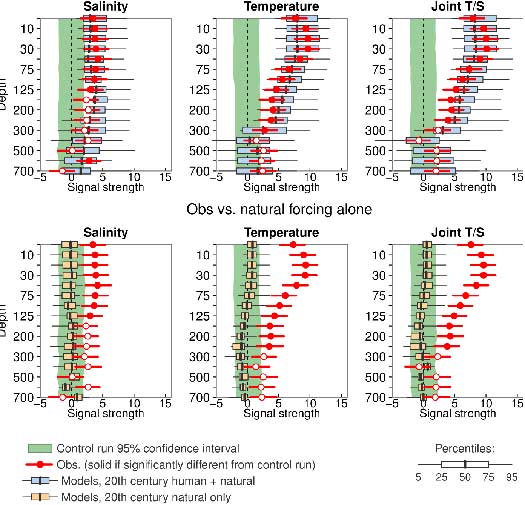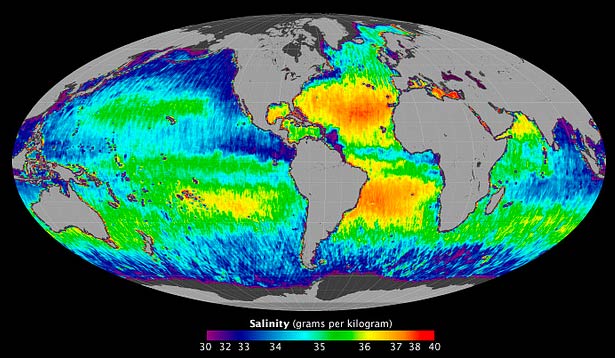In this month’s Geosciences column, Mona Behl discusses a recent paper on the effects of anthropogenically-induced climate change on the planet’s oceans.
A recent study led by scientists at the Scripps Institute of Oceanography, University of California San Diego, suggests that observed changes in ocean salinity are inconsistent with natural climate variations and can be attributed to human-induced climate change.
Co-authored by Peter J. Gleckler, Benjamin Santer, and Paul Durack of the Lawrence Livermore National Laboratory in Livermore, California, and Tim Barnett of The Scripps Institution of Oceanography, the paper, entitled “The fingerprint of human-induced changes in the ocean’s salinity and temperature fields,” was published in the AGU journal Geophysical Research Letters on 2 November 2012. This research builds on the studies conducted by Barnett et al. (2005) and Pierce at al. (2006), examining warming in the upper 70 m of the ocean and concluding that it could also be explained by human-induced climate change. By simultaneously examining temperature and salinity fields, this new work highlights that the observed changes in the ocean are consistent with human forcing of the climate.
The oceans constitute 71% of the global surface area, store 97% of the world’s water, receive 80% of all surface rainfall, and absorb 90% of the Earth’s energy. Salinity, along with temperature, determines the ocean’s density and therefore plays a vital role in guiding ocean currents from the equator to the poles. By redistributing heat around the world, ocean currents have a profound influence on global climate. Scientists monitor salinity in the world’s oceans to determine how evaporation and precipitation patterns are changing. To that end, it has been suggested that decreased salinity at high latitudes in the Atlantic is consistent with observed changes in precipitation in high latitudes. Ocean salinity is also a signature of the global hydrological cycle, which is one of the most important elements of the climate system. Human induced climate change leads to an increased polarisation of the global water cycle, causing arid regions to become drier and high rainfall regions to become wetter. A change in the water cycle poses a substantial risk to human societies and ecosystems, affecting food availability, stability, access, and use.

Salinity and temperature correlations related to human-induced climate change (Source: Pierce et al. 2012)
Pierce et al. (2012), using a technique called ‘detection and attribution,’ compared observed changes in salinity and temperature to 11,000 years of model simulations. Detection is a process of demonstrating that the observed changes in ocean salinity and temperature are substantially different, in a statistical sense, from the changes that may arise due to natural variability of the ocean-atmosphere system, brought on by volcanic eruptions, solar fluctuations, or regular climatic patterns. Attribution, on the other hand, establishes whether the detected changes in ocean salinity and temperature are caused by natural variability (internal or external) or external forcing, such as human-induced changes in atmospheric composition due to an increase in greenhouse gases or changes in land cover. The detection and attribution analysis is, therefore, a rigorous technique to verify computer model simulated changes in ocean salinity and temperature. The findings from this study show that the changes in ocean salinity and temperature over the top 125m are inconsistent with the natural causes of climate change. The observed changes can, however, be detected and attributed to anthropogenic forcing of climate change.
It is very likely that the results of this new study will contribute to the next report of the Intergovernmental Panel on Climate Change, scheduled to be released in phases beginning in 2013.
The research was funded by the United States Department of Energy and National Ocean and Atmospheric Administration (NOAA).
For more background, check out this video by Climate Central, explaining the relationship between ocean salinity and climate.
By Mona Behl, Visiting Fellow with the American Meteorological Society Policy Program

